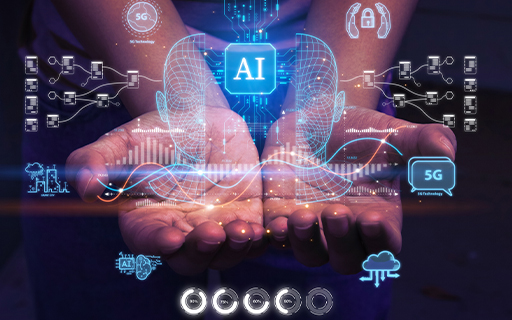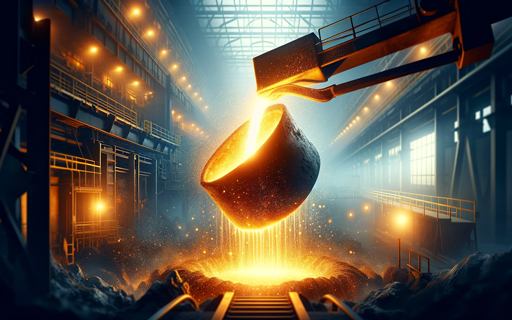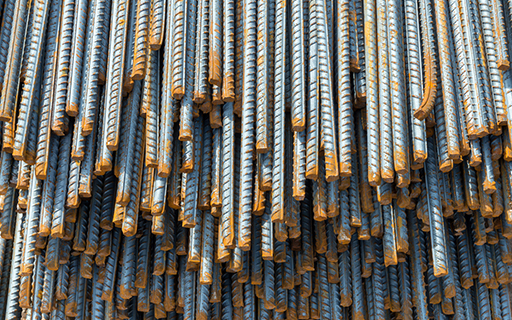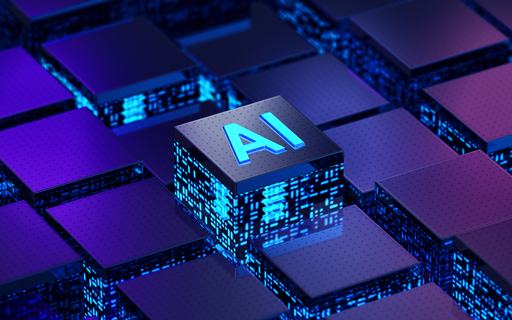- Home
- Outlook Arena
- How AI Will Impact the Steel Sector. Everything You Need to Know...
How AI Will Impact the Steel Sector. Everything You Need to Know...
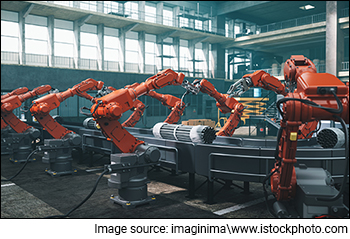
Artificial intelligence (AI) is now being talked about by the media as much as electric vehicles were in in 2021.
The many AI applications including, but not limited to, OpenAI's ChatGPT and Google's Bard have captured the enthusiasm and attention of investors in the stock market.
As AI technology continues to advance at a rapid pace, industries around the world are harnessing its power to drive innovation and productivity. The steel industry, a vital sector of the India's economy, is no exception.
The Indian steel sector has long been a vital cornerstone of the country's industrial growth. With AI-enabled transformation underway, the sector is poised for its next leg of growth.
The use of AI is still in the early stages in the Indian steel industry. But it's only a matter of time before it will be used extensively.
With the inclusion of AI, the industry could see higher efficiency, cost reduction, and better quality of products and services.
Here are some of the areas where, we at Equitymaster, believe that AI could bring significant growth.
#1 Smart Manufacturing and Robotics
Incorporating AI into steel manufacturing processes has paved the way for smart factories.
From handling raw materials to monitoring quality control, AI-driven robots do everything possible to streamline operations and eliminate human error.
This not only boosts productivity but also ensures a safer work environment for employees.
Advanced Robot Welding a New Product

Robotics helps in reducing costs in a number of ways. It optimises the use of raw materials and energy, while also reducing the need for human labor.
Robots even handle raw materials and perform quality control.
Smart manufacturing optimizes the scheduling and sequencing of steel manufacturing processes and reduces idle time.
In 2020, Tata Steel implemented AI-powered scheduling algorithms in their hot strip mill. It resulted in a 7% increase in productivity and a 2% reduction in energy consumption.
If all goes well, Indian steel companies implementing AI will soon enjoy higher throughput. This will be due to optimisation of time and costs, as well as an increase machine availability.
#2 Advanced Prediction
AI-powered predictive analytics has emerged as a game-changer in the steel sector. By analysing massive volumes of historical data, AI algorithms can identify patterns, anticipate market trends, and optimise production processes.
Steel manufacturers can make more informed decisions about inventory management, demand forecasting, and maintenance planning.
#3 Improving Supply-Chain Management
The complex nature of the steel supply chain demands efficiency and real-time decision-making. A study by Gartner shows that demand volatility is one of the primary pain points in the supply chain function.
AI algorithms analyse vast amounts of data, including transportation routes, inventory levels, and market demand, to optimise the supply chain.
By minimising lead times, improving logistics, and reducing costs, AI enables seamless coordination between suppliers, manufacturers, and customers.
Predicting demand helps companies manufacture products accordingly. Global steel companies POSCO and Nucor have already incorporated AI algos to analyse market demand, track inventory levels, and optimise production and logistics.
AI Managing Smart Warehouse

#4 Quality Control and Defect Detection
Maintaining product quality is of paramount importance in the steel industry. AI-powered systems use computer vision and machine learning techniques to detect defects and ensure high-quality output.
Real-time monitoring identifies imperfections during production. This allows for immediate corrective actions. Thus AI helps improve customer satisfaction and reduce waste.
For example, POSCO's smart factory in South Korea has significantly reduced waste. Its AI continuously monitors and adjusts production in real-time.
#5 Customer Relationship Management
AI-powered customer relationship management (CRM) systems help steel manufacturers improve customer experiences. This helps build long-term relationships.
AI can analyse customer data, purchase history, and preferences. This enables personalised and targeted marketing, better after-sales support, and efficient order management.
Challenges impeding adoption of AI in the Indian steel industry
The adoption of AI in the steel industry also raises many concerns that need to be addressed. Here are some of the challenges we believe the industry may face.
#1 Job Losses
With the integration of AI, there is a possibility that certain jobs in the steel industry may become automated, leading to job losses.
As manufacturing processes become more automated, there may also be a lower need for manual labour.
To address these challenges, we believe the steel industry must invest in retraining and upskilling programs. This can help affected workers transition to new roles or industries.
This shift could present an opportunity for skill development. While AI systems automate certain tasks, they also require skilled personnel for programming, maintenance, and oversight.
Upskilling the workforce to adapt to AI technologies ensures a smooth transition and opens doors to new career paths.
#2 Cost of Implementation
Implementing AI technologies in the steel industry can be financially challenging, particularly for small and medium-sized enterprises.
The cost of acquiring AI infrastructure, developing custom solutions, and maintaining the systems can be substantial.
To address this challenge, companies can consider adopting a phased approach, starting with pilot projects to demonstrate the value of AI before scaling up.
Collaborating with technology partners and exploring government initiatives and subsidies can also help alleviate the financial burden.
#3 Legacy Infrastructure
The Indian steel industry often grapples with outdated and legacy infrastructure, which poses a significant hurdle in adopting AI technologies.
Many steel plants still rely on manual processes and lack the necessary digital infrastructure to integrate AI systems seamlessly.
To overcome this challenge, companies should invest in modernising their infrastructure, upgrading equipment with IoT sensors, and establishing robust connectivity networks that enable real-time data transmission and analysis.
However, this is easier said than done as many perceive AI as a threat to traditional jobs and they may be hesitant to embrace technological advancements.
#4 Regulatory and Privacy Concerns
As AI technology continues to evolve, there may be a need for new regulations to ensure these systems are safe, reliable, and ethical.
Steel companies need to ensure sensitive data, including intellectual property and customer information, is protected adequately. The industry must ensure AI used in their operations are safe and secure for all workers and the environment.
This may involve establishing safety standards for AI-powered equipment, regular testing and validation to ensure proper functioning, and implementing strong cybersecurity measures to safeguard against cyber threats.
Top of Form
Indian steel companies leading the way with early AI adoption
Now that you know about both the opportunities and challenges that AI poses in the steel industry, let's look at the Indian steel companies that are at the forefront of this revolution.
Here are the top two...
#1 JSW Steel
JSW Steel is the flagship company of the JSW group. It is the largest integrated private steel manufacturer in India in terms of installed capacity.
The seeds of AI were for JSW Steel were sown back in 2017 when the company began its pilot digital initiative through implementation of Athena project. Over the years, these digital pilots have helped JSW Steel drive a massive earnings impact.
JSW Steel has set an ambitious target to create digitally connected smart steel factories in India by FY25.
The company has also worked with Boston Consulting Group (BCG) as part of its strategy to go on a decarbonisation mode. It's using big data and analytics-driven real-time models to reduce power consumption.
Just five years after its initial entry to the AI space, JSW Steel has implemented AI and digital technologies in over 200 projects.
#2 Tata Steel
Second on the list is Tata Steel.
Innovation is at the Tata group's heart. Tata Steel is spending big bucks on its units for the impending digital transformation.
Back in 2017, Tata Steel launched a US$1 billion smart manufacturing initiative called "Tata Smart Leap." The initiative aims to make Tata Steel a global leader in smart manufacturing by 2025.
The company has been using a unique technology using to optimise production, understand which raw material should go to which manufacturing facility, maximise yields in different plants, and streamline its logistics.
The company has partnered with FarEye, a predictive logistics SaaS platform. This AI-based platform offers real-time tracking capabilities and Tata Steel can keep a tab on where exactly a vehicle is inside the plant and what's its status. The real-time tracking and routing capabilities are powered by machine learning algorithms.
Through platforms like Connected People, Connected Assets, Connected Operations, and Connected Customer, Tata Steel uses technology to enhance employee safety, optimise maintenance, improve operational decision-making, and provide an online portal for customers to access its products.
In an interview, the company's chief information officer (CIO) said they have developed over 1,400 descriptive analytical models that are not manual and run on a tableau screen. This allows users to analyze data and make informed decisions.
Tata Steel has further implemented more than 250 machine-learning-enabled models that automate various processes, such as generating yield, energy, throughput, quality, and productivity (EHQP) metrics.
The future of AI in the Indian steel industry
After languishing for years, the steel sector is finding favour due to several reasons.
The government has tried to stoke the additional steel demand with PLI (production linked incentive) schemes. MNCs like Apple, Samsung, Dell, and Foxconn are all lining up to set up capacities in India.
India's cab service provider Ola is also all geared up to become the largest electric two-wheeler maker in the world.
All of this has taken the projected demand for steel several notches higher than anticipated. So, the demand outlook for steel is looking rosier than ever before.
Embracing AI-powered robotics, advanced analytics, and digital twins can empower the steel industry to achieve unprecedented levels of productivity, efficiency, and sustainability.
The Indian steel sector has a chance to position itself at the forefront of global innovation and competitiveness. But for this transformative future, collaboration and investments are vital.
For now, it's the industry leaders like JSW, Tata Steel and SAIL that have joined forces to implement AI. But in the future, policymakers must also join forces to facilitate knowledge, and develop robust AI infrastructure.
Conclusion
The future of AI in the Indian steel industry is promising.
By harnessing the power of AI, steel manufacturers in India can drive productivity, optimise operations, enhance quality control, and streamline supply chains.
However, it is essential to recognise that the successful implementation of AI requires a combination of technological expertise, investment, and collaboration between industry stakeholders.
With proper planning and execution, we believe AI has the potential to transform the Indian steel industry, making it more competitive and sustainable in the global market.
List of AI Stocks in India
The details of listed AI companies can be found on the NSE and BSE website.
For a more direct and concise view of this information, you can check out our list of AI stocks.
You can also check out Equitymaster's powerful Indian stock screener to filter the best AI stocks in India and the best steel stocks in India.
Also read our article on the Top 5 Artificial Intelligence Stocks to Add to Your Watchlist.
If you're looking for the top unconventional AI stocks, you can check out Richa Agarwal's video on the same. Richa is the Editor of Hidden Treasure, Equitymaster's smallcap recommendation service.
Disclaimer: This article is for information purposes only. It is not a stock recommendation and should not be treated as such. Learn more about our recommendation services here...
![]() Why SAIL Share Price is Rising
Why SAIL Share Price is Rising
Apr 25, 2024
Investors are fancying SAIL over peers Tata Steel and JSW owing to cheaper valuations. There's more to the story though...
![]() Indian Agritech Stock With a Great Future
Indian Agritech Stock With a Great Future
Apr 10, 2024
Driven by AI, this stock riding a megatrend.
![]() Multibagger Alert! 5 Stocks that Rallied Over 1,000% in Financial Year 2024
Multibagger Alert! 5 Stocks that Rallied Over 1,000% in Financial Year 2024
Mar 30, 2024
These 5 stocks made headlines by skyrocketing in the financial year 2023-24. More gains ahead or a possible downturn?
![]() Boring Agri Stock Can Ride the AI Megatrend
Boring Agri Stock Can Ride the AI Megatrend
Mar 27, 2024
In the constantly evolving world of artificial intelligence (AI), businesses are far more prone to disruption than ever before.
![]() Best Steel Stock: APL Apollo Tubes vs Ratnamani Metals
Best Steel Stock: APL Apollo Tubes vs Ratnamani Metals
Feb 21, 2024
India's steel pipe industry is expected to grow at a CAGR of 9% in the next five years. And this pipe manufacturing company has a competitive advantage compared to its listed peers.
![]() Not Tata Motors or Tata Power...This is the Top Performing Tata Group Stock of 2024
Not Tata Motors or Tata Power...This is the Top Performing Tata Group Stock of 2024
Feb 9, 2024
Here's why this Tata group stock zoomed 20% after withdrawing amalgamation plans with Tata Steel.
![]() Ashish Kacholia Did this Before Union Budget 2024. What's Your Strategy?
Ashish Kacholia Did this Before Union Budget 2024. What's Your Strategy?
Feb 1, 2024
Exchange data shows that the ace investor booked profit in this multibagger steel stock via a bulk deal, just days before the Union Budget 2024.
![]() This Artificial Intelligence Stock Has Rallied 45% in 2024 Already
This Artificial Intelligence Stock Has Rallied 45% in 2024 Already
Jan 18, 2024
The greatest dividend company signed a landmark cloud deal during the quarter, resulting in highest ever operating margins of 46%!
![]() Artificial Intelligence Stock Cyient Keeps Rising. Why the Rally is Far from Over...
Artificial Intelligence Stock Cyient Keeps Rising. Why the Rally is Far from Over...
Jan 16, 2024
This midcap IT stock is capitalising on the burgeoning growth of AI sector. Several things suggest the stock has more headroom to grow.
![]() 5 Must Have Tech Stocks for the Upcoming Bull Market Surge
5 Must Have Tech Stocks for the Upcoming Bull Market Surge
Dec 4, 2023
Historical election trend suggests bullish sentiment and these tech stocks could fare well as artificial intelligence takes centerstage.
![]() Best Metal Stock: JSW Steel vs Tata Steel vs Hindalco
Best Metal Stock: JSW Steel vs Tata Steel vs Hindalco
Apr 11, 2024
All major government policies, including Make in India, smart cities, and rural electrification, are driving the demand for metals in India, and these three metals companies are leading the way.
![]() TCS & Infosys SHAKEN by Accenture Downgrade?
TCS & Infosys SHAKEN by Accenture Downgrade?
Mar 30, 2024
What TCS and Infosys investors must know after Accenture downgrade.
![]() Top Performing Steel Stocks of FY24
Top Performing Steel Stocks of FY24
Mar 29, 2024
Indian steel stocks have been quietly delivering impressive returns. Here are the top five that dominated the market in FY24.
![]() Will Accenture's Downgrade Drag Down Infosys and TCS?
Will Accenture's Downgrade Drag Down Infosys and TCS?
Mar 25, 2024
The impact of Accenture's downgrade on Indian IT stocks.
![]() 5 Best Steel Penny Stocks in India
5 Best Steel Penny Stocks in India
Feb 17, 2024
Given the sector's critical role in India's burgeoning economy, the potential for exponential gains makes these penny stocks worth the attention.
![]() Why Subex Share Price is Rising
Why Subex Share Price is Rising
Feb 7, 2024
There's a lot of accumulation happening from HNIs in Subex which has resulted in large volumes.
![]() Why Steel Exchange Share Price is Rising
Why Steel Exchange Share Price is Rising
Jan 29, 2024
The company is one of the few manufacturers of CRS-grade rebars and supplies to the Indian armed forces as well as to other national infrastructure projects.
![]() What are the Top Quantum Computing Stocks in India?
What are the Top Quantum Computing Stocks in India?
Jan 18, 2024
Can Indian companies dominate the global quantum computing space? Find out...
![]() Affle India: The New AI Frontier
Affle India: The New AI Frontier
Dec 26, 2023
The company's innovative data integration and analysis approach has set new standards.
![]() Compete or Die: Netweb Technologies Joins the Artificial Intelligence Race
Compete or Die: Netweb Technologies Joins the Artificial Intelligence Race
Nov 28, 2023
The AI megatrend is picking pace with many tech companies starting to name-drop "AI" on their earnings calls.









